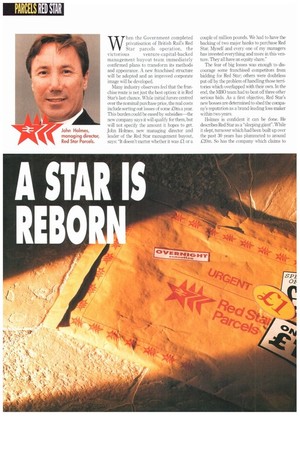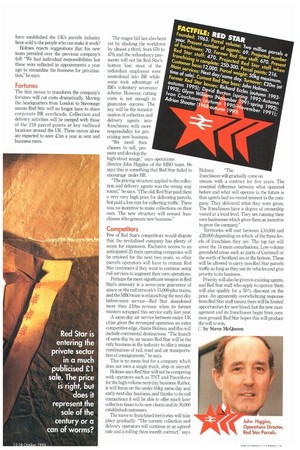W hen the Government completed privatisation of British Rail's Red Star parcels operation, the
Page 44

Page 45

If you've noticed an error in this article please click here to report it so we can fix it.
victorious venture-capital-backed management buyout team immediately confirmed plans to transform its methods and appearance. A new franchised structure will be adopted and an improved corporate image will be developed.
Many industry observers feel that the franchise route is not just the best option: it is Red Star's last chance. While initial furore centred over the nominal purchase price, the real costs include sorting out losses of some 1:9m a year. This burden could be eased by subsidies—the new company says it will qualify for them, but will not specify the amount it hopes to get. John Holmes, new managing director and leader of the Red Star management buyout, says: it doesn't matter whether it was £1 or a couple of million pounds. We had to have the backing of two major banks to purchase Red Star. Myself and every one of my managers has invested everything and more in this venture. They all have an equity share."
The fear of big losses was enough to discourage some franchised competitors from bidding for Red Star; others were doubtless put off by the problem of handling those territories which overlapped with their own. In the end, the MBO team had to beat off three other serious bids. As a first objective, Red Star's neWbosses are determined to shed the company's reputation as a brand-leading loss maker within two years.
Holmes is confident it can be done. He describes Red Star as a "sleeping giant". While it slept, turnover which had been built up over the past 30 years has plummeted to around £20m. So has the company which claims to have established the UK's parcels industry been sold to the people who can make it work?
Holmes rejects suggestions that his new team presided over the previous company's fall: "We had individual responsibilities but these were reflected in appointments a year ago to streamline the business for privatisation," he says.
Fortunes The first moves to transform the company's fortunes will cut costs dramatically. Moving the headquarters from London to Stevenage means Red Star will no longer have to share corporate BR overheads. Collection and delivery activities will be merged with those of the 216 parcel points at key railhead locations around the UK. These moves alone are expected to save Din a year in rent and business rates. The wages bill has also been cut by slashing the workforce by almost a third, from 670 to 470, and the redundancy payments will not hit Red Star's bottom line: most of the redundant employees were assimilated into BR while some took advantage of BR's voluntary severance scheme. However, cutting costs is not enough to guarantee success. The key will be the transformation of collection and delivery agents into franchisees with more responsibility for generating new business.
"We need franchisees to sell, promote and develop the high-street image," says operations director John Higgins of the NIBO team. He says this is something that Red Star failed to encourage under BR.
"The pricing structure applied to the collection and delivery agents was the wrong way round," he says. "(The old) Red Star paid them a very very high price for delivering parcels, but paid a low rate for collecting traffic. There was no incentive to make collections on their own. The new structure will reward franchisees who generate new business."
Competitors Few of Red Star's competitors would dispute that the revitalised company has plenty of scope for expansion. Exclusive access to an anticipated 25 train operating companies will be retained for the next two years, so other parcels operators will have to remain Red Star customers if they want to continue using rail services to augment their own operations.
Perhaps the most significant weapon in Red Star's armoury is a seven-year guarantee of space on the rail network's 15,000-plus trains, and the MBO team is relaunching the next-day before-noon service—Red Star abandoned more than .£10m revenue when its former masters scrapped this service early last year.
A same-day air service between major UK cities gives the revamped operation an extra competitive edge, claims Holmes, and this will include continental destinations "The launch of same day by air means Red Star will be the only business in the industry to offer a unique combination of rail, road and air transportation of consignments," he says.
This is no mean feat for a company which does not own a single truck, ship or aircraft.
Holmes says Red Star will not be competing with operators such as TNT and Parcelforce for the high-volume next-day business Rather, it will focus on the under-50kg same-day and early-next-day business, and thanks to its rail connections it will be able to offer much later collection times to its new clients and its 30,000 established customers.
The move to franchised territories will take place gradually: "The current collection and delivery operators will continue at an agreed rate and a rolling three-month contract." says Holmes. "The franchisees will gradually come on stream with a contract for five years. The essential difference between what operated before and what will operate in the future is that agents had no vested interest in the company. They delivered what they were given, The franchisees have a degree of ownership vested at a local level. They are running their own businesses which gives them an incentive to grow the company."
Territories will cost between £10,000 and £20,000 depending on which of the three levels of franchises they are, The top tier will cover the 14 main conurbations. Low-volume greenfield areas such as parts of Cornwall or the north of Scotland are at the bottom. These will be allowed to carry non-Red Star parcels traffic as long as they use its vehicles and give priority to its business.
Priority will also be given to existing agents, and Red Star staff who apply to operate them will also qualify for a 50% discount on the price. An apparently overwhelming response from Red Star staff means there will be limited opportunities for new blood, but the new management and its franchisees begin from common ground. Red Star hopes this will produce the will to win.
I: by Steve McQueen




















































































































